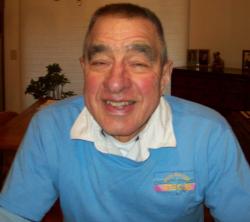One morning over breakfast, already 11 years into his retirement, John Kelley opened the local paper of his small New England town and read the words: “Town Rescue Squad Needs Ambulance Driver.” Maybe if I were 30 or 40 years younger, Kelley thought to himself as he set the paper aside.
Kelley, of Shelburne, Vt., had already spent decades helping others. He graduated with a Bachelor of Divinity degree from YDS—the equivalent of today’s M.Div.—in 1962 and had worked as a church pastor and the dean of a college and in social services for children and adults. He retired at 61 to spend more time with his wife, help take care of his grandchildren, and volunteer with the Special Olympics.

After checking with both the town attorney and the squad’s insurance company, neither of which had an age limitation, the town asked Kelley to come for an interview. “I went in, riding my bike there so the Chief would know I wasn’t totally senile,” he explains playfully. After a long conversation, a tour of the facility, and a brief application, Kelley was offered the position.
Six years after reading the paper that fateful morning, Kelley, now 78, is still an active member of the rescue squad. He is the membership chair, “which means I get to know every person as they come onto the squad, and shepherd them through the initial phase of entry into the team.” Most of the volunteers on the rescue squad are in their mid-twenties—some as young as their late teens—making Kelley more than 50 years their elder. He sees this as an opportunity and a rare privilege. “I find myself continually giving thanks that I am blessed with the kind of health that enables me to do this work and learn from this crew.”
His role as membership chair is an addition to the work he originally signed up for: driving the ambulance. “As a driver, my primary role is to ensure safety: the safety of the crew members, the patients, and the people on the road around us. Because of the things the crew in the back of the ambulance are required to do while transporting patients, they often can’t wear seatbelts and are frequently standing up.” In an emergency situation, rapid stops or sharp turns—Kelley’s driving, in other words—can mean life or death for the person in crisis and the crew.
This, to Kelley, is a key to the Christian life: understanding and internalizing the importance of one person.
Kelley reflects, “When I read the gospels, I find this to be a major theme. There were all kinds of issues going around in Christ’s day, just as in ours—including the Roman occupation—but Jesus still had time for one individual in need at a time.” He healed one person at a time.
Given the way our society stresses immediate gratification, mass communication, and a perpetual fast pace, it’s hard to remember the impact of one individual in the world. Inspired by Wesley Avram’s article in the Fall 2015 issue of Reflections, Kelley focuses on the one corner he is called to serve. “Sure, we’d like to have an impact on the whole vineyard, or at least a major portion of it,” Kelley says, “but the place where our actions are most likely to make a difference is that corner we have the capacity to tend.”
This is how he sees his work with the rescue squad. “When we’re toned out on a 911 call (and this year we’ve had 950 such calls), for us, that one individual in a crisis becomes all-important.”
He may be only one person, but Kelley understands that for each patient, his presence makes a real difference. “Regardless of the time of day or night we go, we weave through traffic with lights and sirens on, knowing little more than that there is a person facing an emergency, and they are frightened. Our role is to get them the help they need, and to treat them with the utmost dignity and respect.” The 950 calls the rescue squad gets every year, are, for Kelley, 950 chances for personal service to someone in need.
From what Kelley has witnessed in his decades of service, he believes “the work of the church is taking place more and more outside the walls of the traditional institutional church as we know it.” He believes, too, that the kinds of individual interactions he experiences through the rescue squad—meeting people where they are, communicating support, love, and dignity in every exchange—are the heart and future of the Christian church. “I heard long ago that the Christian mission is ‘to give and ask nothing in response, not even belief.’ The work of the squad closely mirrors that definition.” Full of local volunteers from all beliefs and backgrounds, the squad enacts the Christian mission to love thy neighbor in a way that traditional churches often neglect.
He credits YDS with giving him life-long tools for thinking about church in nontraditional ways. “Beyond the body of knowledge they gave me at YDS—which was vast—I was taught the need to be open to new ideas, to think through both sides of a question or issue, to thoroughly research topics, and to maximize the use of one’s time and talents. It was a place that allowed us to question our values and explore alternatives to traditional ways of living out our faith in the world.”